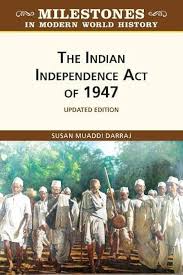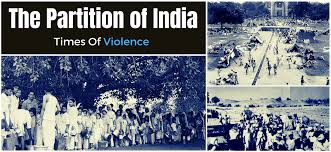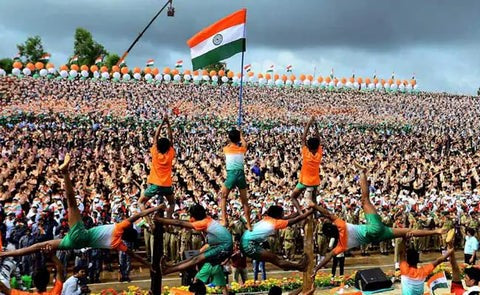
INDIAN INDEPENDENCE ACT
The Indian Independence Act of 1947, a pivotal legislation by the British Parliament, marked the culmination of India's struggle for independence and reshaped the political landscape of the Indian subcontinent in several profound ways:
-
Partition and Two Dominions: The Act officially divided British India into two dominions: India and Pakistan. This partition was based primarily on religious lines, with India predominantly Hindu and Pakistan predominantly Muslim. It led to one of the largest mass migrations in history, accompanied by communal violence and displacement.

-
Transfer of Power: The Act provided for the transfer of legislative authority from the British Crown to the newly formed dominions of India and Pakistan. It empowered their respective Constituent Assemblies to frame and adopt their own constitutions, paving the way for self-governance.
-
Role of Mountbatten: Lord Mountbatten, appointed as the last Viceroy of India, played a crucial role in overseeing the transition to independence and facilitating the partition. His efforts in negotiating between INC and the Muslim League, and in implementing the Mountbatten Plan, were instrumental in shaping the Act.
-
Boundary Demarcation: The Act mandated the appointment of a Boundary Commission to demarcate the boundaries between India and Pakistan, particularly in the highly contentious regions like Punjab and Bengal. This demarcation process was fraught with challenges and led to significant population displacements.

-
Princely States: The Act allowed princely states within British India the option to accede to either India or Pakistan or to remain independent. Over 560 princely states eventually chose to join India, facilitated by agreements like the Instrument of Accession.
-
End of British Suzerainty: The Act formally ended British suzerainty over the princely states and abolished the title of the British monarch as 'Emperor of India', marking the end of colonial rule in the region.
-
Governor-Generalship: Until the new constitutions were drafted and enacted, both India and Pakistan were led by Governor-Generals representing the British Crown. This interim arrangement ensured continuity in governance during the transition to independence.

-
Impact and Legacy: The Act's legacy is profound, shaping modern-day India and Pakistan's geopolitical realities, including ongoing issues related to Kashmir and Indo-Pak relations. It also influenced subsequent constitutional developments and the socio-political trajectories of both nations.
-
International Ramifications: The partition and independence of India and Pakistan had significant international ramifications, influencing global geopolitics during the post-World War II era and contributing to debates on decolonization and self-determination.
- Commemoration: The Act's enactment on 18th July 1947, with independence formally taking effect on 15th August 1947, is annually commemorated as Independence Day in India and Pakistan, respectively, symbolizing the triumph of freedom over colonial rule.
These points collectively underscore the far-reaching implications of the Indian Independence Act of 1947, highlighting its role in shaping the modern history of South Asia and its enduring impact on the region's political, social, and cultural dynamics. BUY FREEDOM FIGHTERS' T-SHIRTS!
[The images used in this blog post are not owned by Anime Devta, they are just for entertainment purposes]
| INDIAN INDEPENDENCE | BHAGAT SINGH | FREEDOM FIGHTERS | HINDU | INC | INDEPENDENCE | FREEDOM |
~Mimansa Sharma

